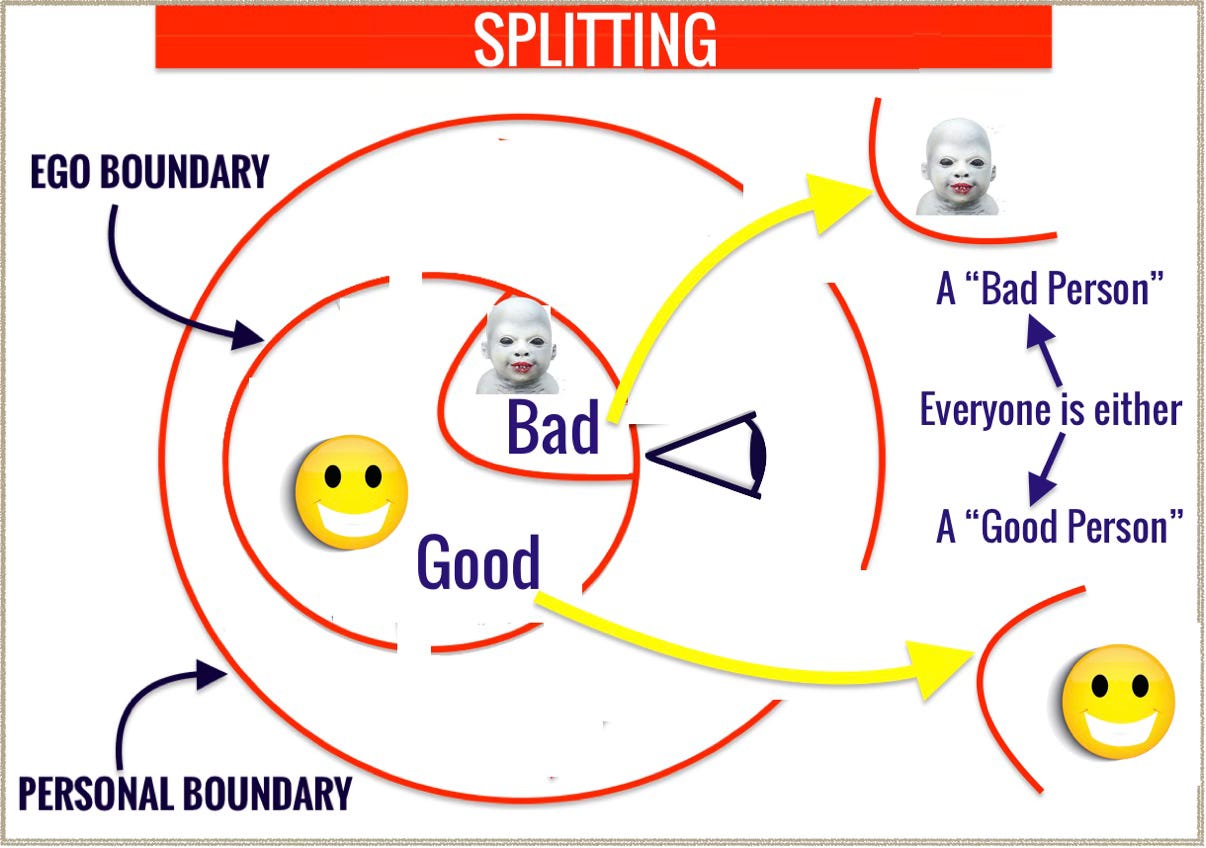Thank you to everyone who tuned into my live video! To access Romantipedia as well as all the courses we offer, please become a Paid Member, here:
SHOW NOTES:
This conversation delves into the psychological concept of splitting as an immature defense mechanism, its origins in childhood, and its implications in adult relationships. Dr. Paul and Jeremy explore how attachment styles influence splitting, the role of triangulation in interpersonal dynamics, and the importance of effective communication in navigating relationships. They also discuss strategies for overcoming splitting through compromise and collaboration, emphasizing the need for curiosity and mutual understanding in fostering healthy connections.
In the discussion, Jeremy Fox discusses the concept of "splitting" as a primitive ego defense mechanism, drawing on the theories of notable psychoanalysts Melanie Klein and Otto Kernberg. They explain that splitting is an immature defense mechanism that develops early in childhood. It occurs when the ego, which mediates between the unconscious desires of the id and the moral constraints of the superego, cannot reconcile conflicting feelings about a person. Instead of seeing the complexities of individuals, splitting leads to all-or-nothing thinking, where a person is viewed as either entirely good or entirely bad.
Dr. Paul elaborates on how this mechanism is especially prominent in borderline personality disorder (BPD), where relationships may fluctuate between idealization and vilification, often due to early attachment experiences. They highlight that children often idealize their parents, which can lead to cognitive dissonance if the parents exhibit poor behavior. This lack of nuance in perception can cause significant issues in adult relationships, as individuals with a splitting defense may struggle to see others in shades of gray and may quickly shift their views of others.
The discussion also touches on the connection between attachment styles and the development of splitting in adulthood, indicating that insecure or anxious attachment can contribute to this kind of black-and-white thinking. Dr. Paul expresses an interest in integrating various theories, including those of Klein and attachment theory, to better understand the underlying mechanisms behind splitting.
In this discussion, Dr Paul explains the concept of "splitting," a primitive ego defense mechanism described by psychoanalysts Melanie Klein and Otto Kernberg. Splitting occurs when the ego struggles to integrate the conflicting aspects of relationships, leading to an all-or-nothing perspective—where individuals are seen as either entirely good or entirely bad. This defense mechanism develops early in childhood, particularly in relation to attachment figures, such as parents.
Klein posits that children idealize their parents as a coping strategy, which prevents them from acknowledging negative traits. This idealization can create significant emotional dissonance when a parent exhibits harmful behaviors, ultimately causing the child to vacillate between viewing the parent as a loving figure and as a villain. The discussion notes that splitting not only manifests as black-and-white thinking but also influences emotions like idealization and vilification of others.
Furthermore, Jeremy raises a question about the relationship between attachment styles—such as poor or anxious attachment—and the emergence of splitting in adulthood. Dr Paul acknowledges this connection, indicating that early attachment experiences can set the stage for adult splitting behaviors.
Overall, the conversation delves into the psychological underpinnings of splitting in the context of child development and adult interpersonal relationships.
Takeaways
Takeaways
Splitting is an immature defense mechanism learned in childhood.
Attachment styles, particularly avoidant and anxious, influence splitting behavior.
Triangulation is a complex interplay of splitting and projection.
Effective communication is crucial in navigating relationships and avoiding splitting.
Compromise and collaboration are essential superpowers against splitting.
Mentalization helps individuals understand their own and others' behaviors.
Recognizing the good and bad in others is key to overcoming splitting.
Curiosity about others' perspectives can mitigate splitting tendencies.
Healthy relationships require ongoing negotiation and communication.
Understanding the dynamics of narcissism can help in recognizing splitting behavior.
Titles
The Psychology of Splitting: Understanding Ego Defenses
Attachment Styles and Their Impact on Relationships
Sound bites
"Splitting is an immature defense."
"Splitting occurs in the infant."
"Mentalization is observing ego."
Chapters
Chapters
00:00 Understanding Splitting as an Ego Defense Mechanism
03:02 Attachment Styles and Their Impact on Splitting
06:07 The Role of Mentalization in Ego Development
08:55 Triangulation and Its Connection to Splitting
12:06 The Dynamics of Narcissism and Splitting
15:02 The Boundary Function in Ego Defenses
17:56 The Impact of Splitting on Relationships
20:59 Gossip, Reputation, and Social Dynamics
23:59 The Consequences of Splitting in Communities
39:49 Survival and Growth in Modern Society
40:18 The Evolution of Personality Disorders
41:17 Superpowers Against Narcissism
42:17 Building Mature Romantic Partnerships
44:44 Curiosity as a Foundation for Relationships
49:23 The Dynamics of Compromise
53:30 Collaboration: The Power of Co-Laboring
58:16 The Importance of Action in Relationships
01:01:21 Balancing Idealization and Practicality
01:03:41 The Four C's of Healthy Partnerships
01:08:26 Mindfulness and Ego Defense in Relationships
















Share this post